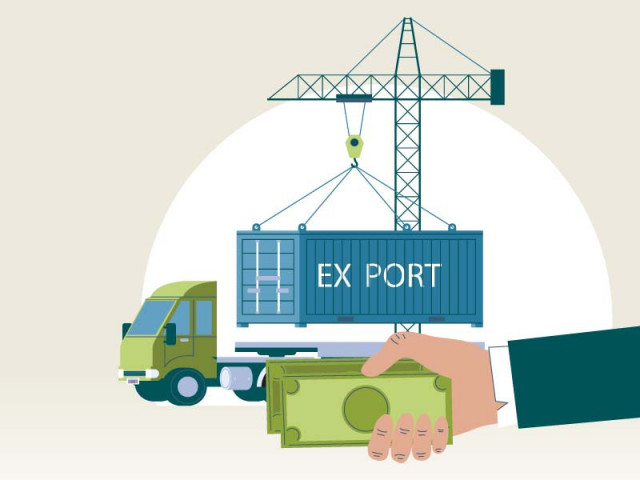Banks instructed to deduct 0.25% export surcharge
Move comes after a staggering 21% drop in export earnings in March 2023

The State Bank of Pakistan (SBP) has taken steps to collect funds from exporters in an effort to boost the country’s overseas sales. The move comes after a staggering 21% drop in export earnings in March, highlighting the pressing need to address the ongoing crisis.
Export earnings hold the key to resolving Pakistan’s recurrent balance of international payment crisis, but issues have plagued the sector for quite some time.
In a partial modification of the existing procedure, the SBP on Thursday instructed commercial banks to deduct the export development surcharge (EDS) at 0.25% of the total export proceeds at the time of payment receipt and deposit the same directly to the central bank. The commercial banks had been depositing the funds at the National Bank of Pakistan (NBP) for over two decades, according to a previous notification issued in 2003.
Speaking to the Express Tribune, leading textile exporter Jawed Bilwani said the funds will now be utilised more purposefully. “Earlier, the funds were given to the ministry of finance which used to utilise the funds for other purposes instead of improving exports, for which the funds were collected from exporters,” he said, lamenting that, “The ministry of finance has utilised funds worth Rs25-30 billion for other purposes over a number of years… instead of using the funds for improvement in exports.” Effective from May 10, 2023, banks will transfer the consolidated amount of EDS deductions directly to the SBP through Real Time Gross Settlement Systems (RTGS) rather than depositing the same at NBP. The central bank will deposit the funds to Export Development Fund (EDF), an autonomous body operating under the Ministry of Commerce.
Real Time Gross Settlement Systems (RTGS) are mechanisms that enable banks to make large-value payments to one another in real-time using online telecommunication facilities as well as state-of-the-art computer systems.
EDF, an autonomous body, is working on over 300 approved projects aimed at addressing bottlenecks faced by exporters and producers of export goods and services in Pakistan, with a view to increasing the performance of the export sector. The government has approved funds worth over Rs32 billion for the projects, but only Rs21 billion has been released so far.
The central bank added in the notification that any instance of misreporting of deduction and collection of export development surcharge (EDS) will be dealt with in accordance with penal provisions of Banking Companies Ordinance, 1962 and penalty scale issued thereof by the SBP. “Banks are advised to ensure meticulous compliance of (the)…instructions. The undue retention of government funds by the banks will attract penalty as costs of funds at the penal rate of 1.5 times of the SBP’s ceiling rates of retention dates.”
Bilwani urged the government to bring transparency in the utilisation of the export development surcharge, adding that technology can help eliminate discrepancies. He also stressed the need to provide exporters with utilities, such as power, gas, and water, at competitive prices to compete with regional players at world markets.
Pakistan’s exports remain almost one-third of total imports, resulting in large trade and current account deficits. The workers’ remittances sent home by overseas Pakistanis are used to finance these deficits. Despite this, Pakistan’s import for local consumption remains significantly higher compared to exports.
Experts have been emphasising from time-to-time the need to diversify exports from the heavily dominated textile sectors to other areas like technology, financials, agriculture, and energy ones. They also called for finding new export markets and conducting extensive research and development.
Topline Research has reported that export earnings dropped 21% to $2.43 billion in March 2023, compared to $3.07 billion in the same month of the previous year. The drop was mainly due to falling global demand and a fall in commodity prices, the report said. On a month-on-month basis, however, exports improved to $2.43 billion in the month compared to $2.21 billion in the previous month of February.
Published in The Express Tribune, April 21st, 2023.
Like Business on Facebook, follow @TribuneBiz on Twitter to stay informed and join in the conversation.



















COMMENTS
Comments are moderated and generally will be posted if they are on-topic and not abusive.
For more information, please see our Comments FAQ